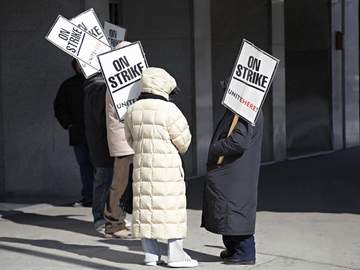
‘Equal opportunity employer’
Equal opportunity employer spiked in lookups last week, after a senator averred that the United States armed forces are not one.
Sen. Tommy Tuberville, an Alabama Republican and former football coach, said Tuesday that the U.S. military is “not an equal-opportunity employer.” The military is an equal-opportunity employer, and the Pentagon has an “Office of Equal Employment Opportunity.”
— Chelsea Cox, CNBC, 27 Sept. 2023
An equal opportunity employer is “an employer who agrees not to discriminate against any employee or job applicant because of race, color, religion, national origin, sex, physical or mental disability, or age.” The word is sometimes used figuratively, with the general meaning of “a person or thing which acts or affects people indiscriminately.” Our earliest record of use comes in 1961:
Qualified applicants are invited to write to: Professional Personnel Officer - Fansteel Metallurgical Corporation - 2200 Sheridan Road, North Chicago, Illinois, U.S.A. An Equal Opportunity Employer
— (advt) The Times (London), 25 Oct. 1961
‘Tentative’
Tentative had a rare week in the sun, after the word was used in seemingly hundreds of newspaper articles, describing the incipient deal between the Writers Guild of America and studios.
WGA Strike To Officially End At Midnight As Guild Leaders Approve Tentative Deal With Big Gains
— (headline) Deadline, 26 Sept. 2023
Tentative, in the sense above, means “not fully worked out or developed.” The word came to English from the Latin tentare, meaning “to feel, test, attempt,” and in its earliest use in English had the meaning “attempted, provisional, experimental.” Tentative shares its tentare root with a number of other English words, including tentacle and tempt.
‘Picket line’
Another strike-related word (but which is related to a different strike) that spiked in lookups was picket line, after Joe Biden became the first sitting president to stand with workers in one of these.
President Joe Biden made history Tuesday when he visited a picket line in Michigan in a show of loyalty to autoworkers who are striking for higher wages and cost-of-living increases.
— Peter Nicholas, NBC News, 26 Sept. 2023
The modern sense of picket line is “a line or group of people who are refusing to go to work until their employer agrees to certain demands.” Some of you may be wondering ‘what is a picket, and why must it be in a line?’ Before it was applied to striking workers, picket had referred to a pointed or sharpened stake, post, or peg, such as might be used to set up a military camp or tent. The word was also formerly used with such military meanings as “a detached body of soldiers serving to guard an army from surprise” (known as an outlying picket) or “a detachment kept ready in camp for such duty” (known as an inlying picket). The “sharpened stick” sense of picket dates back to the first half of the 19th century, and the “striking worker” sense began to be used at the end of that century. If you have a large number of pickets lying about your house you do not need to arrange them in a line.
This morning when the Woerueses’ delivery wagon drove up to the strikers’ picket line the driver was called upon to halt.
— The St. Louis (Missouri) Globe-Democrat, 1 Jan. 1887
‘Cross talk’
Republican presidential candidates vying for their party nomination to this office held another debate, and cross talk was among the words widely used in describing the event.
The second GOP primary debate was beset by interruptions, cross-talk and protracted squabbles between the candidates and moderators over speaking time.
— Eric Bradner, Gregory King, Steve Contorno, Daniel Strauss, and Arit John, CNN, 28 Sept. 2023Crosstalk and weak zingers hand win to absent Trump at Republican debate
— (headline) The Guardian (London), 28 Sept. 2023“Thank You for Speaking While I’m Interrupting”: The Crosstalk Chaos of the Second Republican Debate
— (headline) The New Yorker, 28 Sept. 2023
Cross talk came into our language in the late 19th century, and initially had very little to do with conversations: its first meaning was “unwanted signals in a communication channel (as in a telephone, radio, or computer) caused by transference of energy from another circuit (as by leakage or coupling).” The sense of the word that is most applicable to campaign debates is “conversation that does not relate to the main topic being discussed.”
Words Worth Knowing: ‘Pie-counter’
The week’s word worth knowing is pie-counter, defined as “a political patronage or spoils especially when regarded as venal or corrupt.” The counter portion of this word differs from that found in bean counter; a bean counter is one who counts beans, whereas a pie-counter is a counter where one accrues pie (in the sense of “something easy or much desired”). Please note that this word is presented in entirely non-partisan fashion.
“Romireland” is possibly a decayed politician who has probably failed to reach the pie counter owing to the influence of the Post-Dispatch, hence his hatred for your paper.
— St. Louis (Missouri) Post-Dispatch, 7 Aug. 1894




